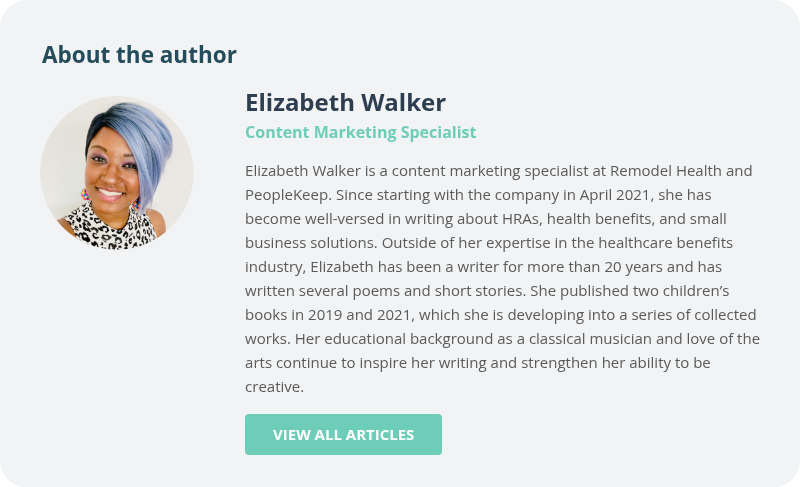When brokers should recommend different types of alternative group models
By Elizabeth Walker on Jul 9, 2025 9:39:00 AM

In today’s health insurance industry, many brokers are realizing that traditional group coverage isn’t the only option for their clients. If an employer has a limited budget, unique employee demographics, a smaller company size, or experiences a double-digit rate increase, a one-size-fits-all group health policy might not be the best fit.
That’s where alternative health benefits come in. More and more employers are switching to personalized health benefits to combat rising health insurance costs. These benefits give employees greater flexibility and control over their medical care compared to group health plans. But if you’re new to alternative health benefits, it can be difficult to know where to start.
This article reviews five key factors to consider when recommending alternative health benefits to your clients. With these tips, you can better match each client with a benefit that meets their goals and satisfies their employees.
In this blog post, you’ll learn:
- What factors you should look at when deciding whether an alternative to a traditional group health insurance plan is better for your client.
- How to assess your client’s workforce, goals, and budget to guide them toward the right health benefit.
- How to navigate potential challenges that could impact your client’s ability to offer alternative health insurance plans.
1. Company size and employee demographics
Business size and staff makeup are vital when determining whether an alternative health benefit is a better fit than a group plan. For example, small employers often struggle to buy fully-insured group health insurance coverage due to limited bargaining power with insurers and the high premiums that come with a smaller group. They may also have a hard time meeting the group plan participation rates.
But you shouldn’t only look at the total number of employees. You should also consider job types (e.g., full-time, part-time, or seasonal) and whether the team works in one location, has a hybrid arrangement, or does remote work. Employers with diverse teams may enjoy more flexible solutions that can meet their various needs, which group plans may not meet.
2. Budget obligations and risk threshold
Every employer has a different financial risk tolerance, regardless of their company size or industry. Some business owners may be willing to take on more risk for greater cost savings. However, others want cost predictability and stability.
For example, employers with level-funded products or self-funded plans take on more risk, even though they often buy stop-loss insurance coverage to limit potential high claims. These options give them more control over plan design and spending than group plans.
If a client wants to reduce their financial risk, you might suggest a defined contribution benefit, such as an individual coverage health reimbursement arrangement (ICHRA). These types of benefits cap employer liability and don’t have premium rate hikes.
By assessing how much risk a client is willing to take on, you can steer them toward the right benefit.
3. Company goals and potential growth
Your client’s long-term goals and business growth projections will also impact what benefit you suggest. Group health insurance coverage can be too rigid or limiting for companies growing quickly or expanding into many locations. Businesses that aren’t expecting significant growth might prefer consistency over flexibility.
Additionally, companies preparing for mergers, acquisitions, or shifts in business operations can benefit from alternative solutions that are more agile during periods of change. The chosen method should be able to meet their needs without difficulty in changing plan designs or renegotiating with carriers.
Before making any determination, discuss your client’s business objectives so you can recommend a healthcare model that will support their future goals without compromising quality or coverage.
4. Benefits strategy and recruiting practices
Some employers use their health benefits package as a strategic tool to attract and keep workers. Others only want to meet the minimum compliance and insurance regulations without exceeding their budget. Knowing where your client falls between the two can help you propose a solution that aligns with their benefits strategy.
Clients who want to offer competitive, customizable benefits may consider an ICHRA an excellent solution. ICHRAs give employees the ability to buy the individual health plan that meets their unique needs. This flexibility can improve recruitment efforts and boost retention, especially for younger workers. But employers looking to fulfill minimum requirements may opt for a more traditional and familiar option.
The more you understand your client’s approach to employee benefits, the better positioned you’ll be to help them achieve their goals.
5. Administrative burden and compliance obligations
Managing a traditional group health insurance plan can be time-consuming and complex. But not every employer can meet the administrative demands of alternative benefits. Certain plans must follow specific affordability, plan guidelines, and nondiscrimination rules. They may also need extra recordkeeping, employee communications, or coordination with third-party administrators (TPAs) to meet federal and state regulations.
Before recommending a solution, ask your client if they can handle the benefits management process. What size is their HR team? Are they willing to work with outside vendors or TPAs? Do they understand the reporting compliance requirements associated with various alternative health plans?
Employers can use ICHRA administration software to help them manage their benefits. But even so, it’s best to know how your client feels about administrative tasks, so the benefit they choose is practical to install and sustain.
How the ICHRA can support your clients’ needs as a flexible alternative to traditional group health insurance coverage
An individual coverage HRA (ICHRA) is an employer-owned benefit that business owners of any size or industry can offer instead of traditional group health coverage.
With an ICHRA, the employers choose a defined monthly allowance that W-2 workers can use to buy qualified individual health coverage. They can shop for a plan that provides minimum essential coverage (MEC) on a public exchange, like a state-based marketplace, or a private exchange. If you and your client work with Remodel Health, we facilitate shopping for individual plans right from our platform.
Then, employees use their tax-free monthly allowance to pay for their health plan’s monthly premiums. Unlike health stipends and other informal benefits, ICHRA contributions are free from payroll tax for your client, and premium payments are income tax-free for employees.
With most ICHRA vendors, employers pay for their plans first and then request reimbursement. But with Remodel Health, your clients can take advantage of our AutoPay capabilities for off-exchange plans.
Here are some other perks of the ICHRA:
- An ICHRA eliminates the need to renegotiate health plan rates or work with insurance plan carriers in multiple states. This makes the benefit flexible enough for clients with companies in several locations or who allow remote work.
- Employers have complete cost control over the allowance amounts they decide to offer. There are no federal maximum contribution limits, so businesses can tailor allowances to match their goals and budgets.
- Remodel Health can recommend a contribution strategy for your clients based on their previous benefit spend, goals, and affordability considerations.
- Any business owner with at least one W-2 worker can provide an ICHRA. This gives small businesses more choice than simply choosing a small group plan or a traditional self-funded benefit.
- Compared to group health plans and working with insurers, benefits administration for an ICHRA is quick and easy for employers.
- Suppose your client’s company is an applicable large employer (ALE) or is growing to the size of an ALE soon. In that case, offering an affordable ICHRA allowance can help them meet the Affordable Care Act’s (ACA) employer mandate requirements.
- Clients can offer different contribution amounts by employee class, age, or family size. They can also design their plan to cover eligible employees’ qualified dependents.
Conclusion
Traditional group health insurance plans remain a popular option for employers. But it isn’t the only option. Brokers who know when to suggest alternatives to group plans can better serve their clients. By evaluating factors like company size, risk, and goals, you can guide employers toward benefit solutions that are practical and strategic.
At Remodel Health, our ICHRA+® solution is a personalized health benefit that your clients and their staff will love. Let us work with you to provide them with a cost-effective HRA and hands-on support to help them design and manage their new benefit.
Ready to help your clients offer an ICHRA? Chat with us, and we’ll get you on your way!
Check out more resources
See these related articles

Who is eligible for ICHRA?
Wondering who qualifies for ICHRA? Explore ICHRA eligibility rules for employees and how employers can structure classes to meet compliance and coverage goals.

Eligible expenses for ICHRA reimbursement
Wondering what you can reimburse with an ICHRA? Explore eligible expenses like premiums and medical costs that qualify for tax-free reimbursement.
.jpg)
Are rate increases better with off-exchange plans than with on-exchange plans?
Wondering if off-exchange plans are seeing better rates for 2026? Compare rate trends between on- and off-exchange plans to see which offers better savings potential.

